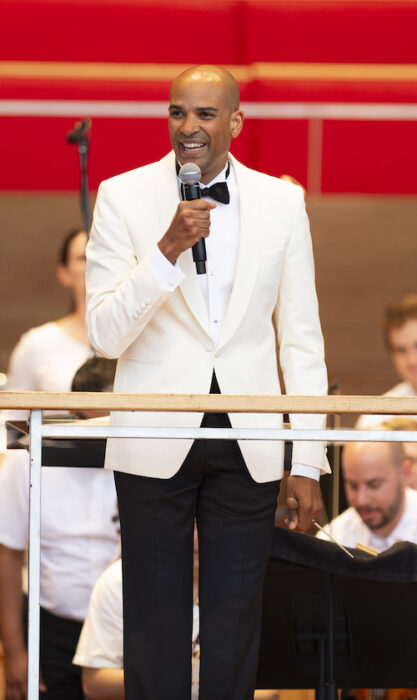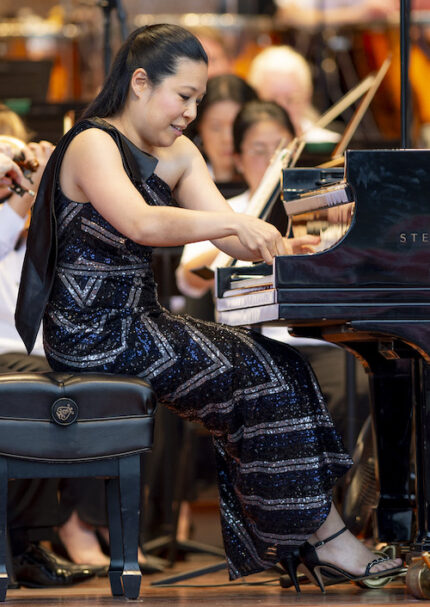Edusei excels in impressive Grant Park Orchestra debut

For those at Millennium Park on Wednesday when a volatile mixture of storms and tornadoes nixed that evening’s Grant Park Orchestra concert at the 11th hour, Friday’s performance at the Pritzker Pavilion felt like a mulligan. While the humidity was oppressive, Friday’s storms kindly arrived well after the concert concluded, allowing conductor Kevin John Edusei to make an impressive festival debut.
Friday’s program opened with This Midnight Hour, a 15-minute essay written in 2015 by Anna Clyne, previously the Chicago Symphony Orchestra’s composer-in-residence. Clyne draws inspiration from two poetic sources for this work: Baudelaire’s “Harmonie du soir” (“Evening Harmony”), and “La Musica” by Juan Ramón Jiménez. The latter consists of essentially a single line—“Music, a naked woman, running crazed through the pure night”—a frenzy reflected in Clyne’s menacing opening.
This first section suggests all manner of things that go bump in the night, and an atmosphere of nighttime creepiness prevails. Ultimately this music gives way to a darkly cinematic waltz—presumably reflecting Baudelaire—first intoned in low bassoons before moving through the other wind sections. Near the end, a trumpet placed near the back of the stage trades somber lines with a colleague in the section in a haunting antiphonal effect, before a final blast from the timpani and low strings punctuates the score.
Edusei, who is wrapping up an eight-year stint as chief conductor of the Munich Symphony Orchestra in his native Germany, was an inspired guide through Clyne’s evocative painting. He led organic transitions and brought nuances of Clyne’s dense orchestration to light in a well-paced reading.

Pianist Joyce Yang is one of the Grant Park Music Festival’s new artists-in-residence this summer, and had been billed to perform Tchaikovsky’s Piano Concerto No. 1 at Wednesday’s rainout. Yang’s residency fortunately was back Friday in Liszt’s Totentanz, a virtuosic treatment of the Dies irae chant.
Yang’s performance was dynamic, with showmanship and technique to spare, but Totentanz is Liszt as his most bombastic and kitschy. From the clangorous opening through the various treatments of the motto hymn, the impression is one of generalized schlock, with the fleeting reflective moments feeling like apologetic filler before the next batch of fireworks.
Yang was a commanding presence before the orchestra, with effortless glissandos up and down the keyboard and in one variation offering a clinic in fast repeated notes. Still, one regretted having missed the opportunity to hear what she would have to say in a (relatively) more subtle work like the Tchaikovsky. Edusei calmly presided over the perfunctory accompaniment.
The second half was devoted to music from Prokofiev’s Romeo and Juliet. Prokofiev excerpted three different suites from his complete ballet, and for Friday’s performance Edusei assembled music from all three in an hour-long sequence that followed the dramatic progression of the play (which Prokofiev’s do not).
Edusei intelligently shaped the Shakespearean drama. The striding theme of “Montagues and Capulets” went with swagger undergirded by stentorian brass, and the strings were tautly precise in the playful scampering of “Julietas a Young Girl.” “Masks” had an apt feel of coquettish flirtation, and Edusei helped the Balcony Scene to unfold with a palpable sense of nocturnal ardor.
“The Death of Tybalt” opened in a precipitous fashion, before giving way to angular, murderous jabbing, which contrasted with the sense of sage reflection Edusei drew in “Friar Laurence.” The final three movements progressed with the fated inevitability of the play’s final act. Edusei brought out the anguish and transcendence of these final pages, capping a memorable first outing with his Grant Park colleagues.
The program will be repeated 7:30 p.m. Saturday. grantparkmusicfestival.com
Posted in Performances

